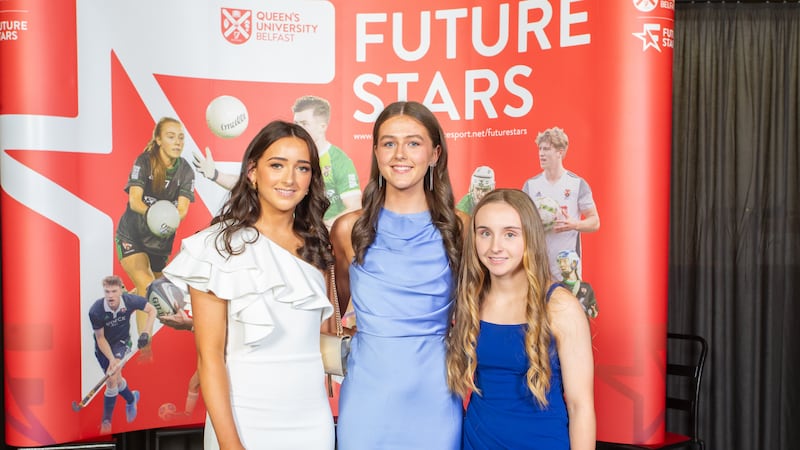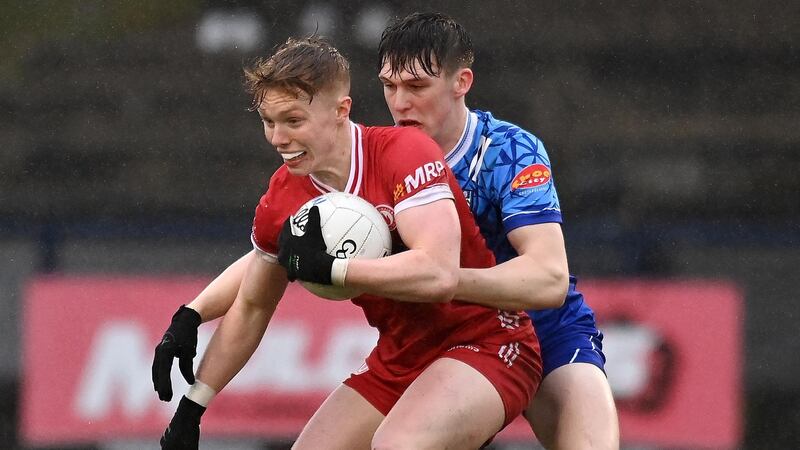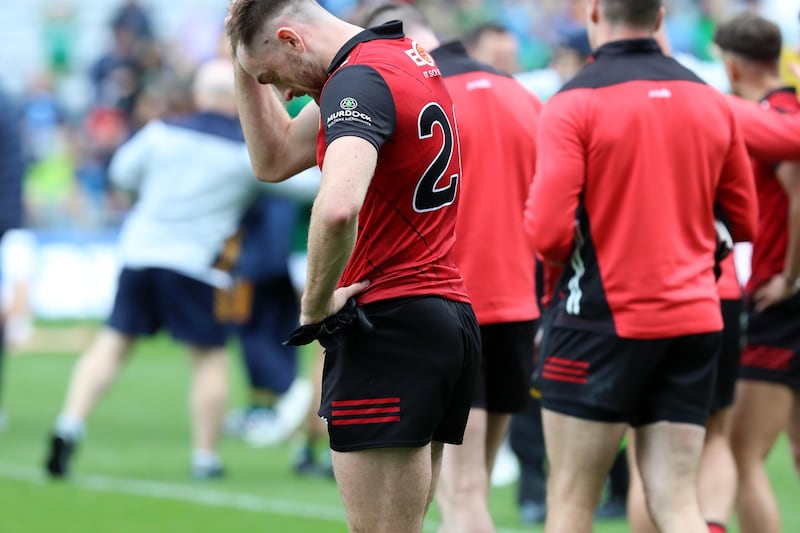IT’S a damp and sluggish Friday morning in Navan. The skies above St Patrick’s Classical School have cleared after a good hard rain.
The 900 pupils or more have long escaped for summer.
All that remains on this wet August morning is the comforting jangle of a caretaker’s keys that echo across the empty yard and the nice lady in reception, Marion, who misses the kids like a mother would.
Colm O’Rourke, the school’s principal since 2007, has arrived for work to plan for the new term and prepare for the youth of the surrounding country hitting the school gates like an avalanche early next month.
O’Rourke, who was born in Leitrim, wouldn’t have it any other way. He enjoys his job.
“I like young people. I find them refreshing, energetic and enthusiastic,” says the former Meath footballer.
“Being involved in football here too has been fulfilling. If I wasn’t involved with the teams I probably wouldn’t bother, and I suppose at the time when I got into teaching it suited perfectly: short hours, time for training and time for doing lots of other things.”
With a broad smile, he adds: “I always considered I was going to get a proper job when I finished playing but I never got around to it.”
But he has no regrets about staying in the teaching profession.
“I suppose I’ve various other interests that keep me occupied, between television and writing and various business interests, so it’s always been a very busy life for me.”
We sit in the principal’s office for this interview right beside the school’s reception.
It’s a modest, reasonably tidy room that lacks the self-congratulatory narcissism of framed photographs of the man that frequents it most.
Now, in the nearby corridors, where there is no wall space for anything other than framed photographs of past school teams is an entirely different matter, and the school’s principal is in his element pointing to the three Hogan Cup-winning team photographs of 2000, ’01 and ’04.
He says they should have added a fourth Hogan Cup in ’06 but lost after extra-time to Ulster champions Abbey CBS.
The Navan boys were three points up with just a few minutes remaining and lost.
In 2013, their namesakes of Maghera beat them in their last final appearance.
“He’s a very formidable man, good humoured and he doesn’t take himself too seriously,” says his RTE colleague and good friend Joe Brolly.
“I went down to his school to give a talk and he is at ease as principal and is held in great regard. What you see with Colm is what he is.”
Leaning back on his swivel chair, O’Rourke is in wistful mood.
He turns 60 at the end of the month but doesn't look a day over 50.

You get the impression he wants his 60th birthday to pass without fuss.
“We’ll [Simonstown] probably be training that night,” he says, dismissing any notion of him blowing out candles and wearing a coat-hangar smile.
It’s coming up to 30 years since Meath announced their return to the inter-county stage by beating Cork in the 1987 All-Ireland final.
O’Rourke was a majestic presence on that Meath team that was moulded so brilliantly by Sean Boylan.
The team was laced with star quality and big hearts all over the field: Lyons, Stafford, O’Connell, McEntee, Flynn.
“Colm was one of the great Gaelic footballers of the very highest level,” says Brolly.
“He, more than anyone, drove on that Meath team to win the All-Ireland.
“And in fact the first All-Ireland that Meath team won in 1987 it was O’Rourke who dragged that team through it.
“He scored the goal. It was typical O’Rourke: sheer bloody-mindedness. He was very tall but very, very quick.
“He was all bones, you know. He ran into me one day in a National League semi-final when we actually beat them; it was like being hit by a five-bar gate.
“Very, very tough and he relished the physical combat side of the game. But, of course, he was a great artist on the field.
“A fabulous kicker of the ball and a great fetcher above his head. There wasn’t anything that he didn’t have.
“He was the leader of the team. He was without any doubt the most influential Meath footballer of his generation.”
Maybe it’s because he’s been reminded by this reporter of his impending birthday on August 31 that has him in reflective mood on this dank Friday morning in school.
He grapples with the swiftness of time and can’t understand it.
The last 30 years have gone by in a flash.
“Talking to different lads and that, you know, life is short, very short,” O’Rourke says.
“You get to a certain age in life and you’re looking forward and you say to yourself: ‘There’s not much time to do the things that you’d like to do’.
“The 30 years have gone by so quickly, really, really quickly.
“I find it hard to credit that. And you still feel young.
“I suppose we’re lucky too when you think of Tony Keady [Galway hurler who died recently].
“All our team are fit and well, all reasonably healthy. Thank God for that but it’s just gone by in a blink of an eye.”

After years in the wilderness Meath won back-to-back All-Ireland titles in 1987 and ’88, beating Cork in both deciders.
They had been building towards something when Boylan took charge in 1982.
“Sean Boylan had a personality, not any great organisation behind him, but he was the type of fella that got people working together.
“Now, we were rock bottom so it was a good time to take over because there was only one way we could go.
“As well as that, there were good players – it wasn’t as if there were no footballers around – and he started to get them together.
“When he took over there was great emphasis on club football, a very competitive club championship.
“So he broke down the barriers there and got everybody together.
“In ’83 Dublin beat us after a replay and they went on to win the All-Ireland. We won the Centenary Cup in ’84.
“We had a bad year in ’85 and then we won Leinster in ’86, and that was the big breakthrough.”
Meath may have banked a couple of All-Irelands but back-to-back final defeats awaited them in 1990 and ’91.
Meath’s preparations for the ‘91 final against Down were hampered by illness to O’Rourke.
Up until the morning of the game O’Rourke’s participation was in doubt.
“I had bad sickness that year,” he says, wincing at the memory.
“I had continuous tonsillitis throughout the year and coming up to the All-Ireland final [against Down], about 10 days before it, I got pneumonia.
“I was in hospital getting tests...
“I remember Sean Boylan coming down to see me on the Friday and I thought I was getting better and then I got this desperate sickness and I had to go back to bed on Friday evening.
“I was sweating and I remember Sean coming in and him taking one look at me.
“I said: ‘Sean, say nothing until tomorrow and see how I am.’ I remember Liam Hayes [Meath captain] was with him as well.
“On Saturday, I definitely improved. Sunday I had improved again and I remember feeling reasonably well.
“Now, I’d lost a good bit of weight. Obviously I’d no training, no nothing done. But I was beginning to feel better.”
O’Rourke adds: “The big thing was the doctors - including [Meath team-mate] Gerry McEntee – because your lung function goes down and it puts pressure on the heart.
“The team doctor, a fella called Jack Finn, would always be telling you you’d be fit to play, even if you’d a broken leg, and Gerry McEntee would’ve been the same.
“But both of them were saying: ‘We don’t think you should play.’
“I’d say Sean was concerned too.”
O’Rourke started on the bench and entered the fray after 43 minutes. But Down were already in the ascendancy.
“It was a very open game, which was quite unlike us,” he recalls.
“I don’t know the exact sequence. So Sean asked me and I said I wanted to go on.
“At that time we were maybe six or seven points behind.
“As soon as I came on they got the goal and they got another point or two and their lead went out to 10 or 11.”
Although the game was slipping from Meath’s grasp O’Rourke proved a thorn in Down’s side in the closing stages.
“That was a good Down team. They had a very good forward line: [Greg] Blaney was very good, Mickey Linden was a great player and [James] McCartan.
“And I’d say a lot of players for Down – Ross Carr, Eamonn Burns – played really well on that day and probably never played as well again.
“Like, Eamonn Burns kicked two points from play and I don’t think Eamonn kicked two before or since.
“I’d say they probably got their best performance when it counted most which is a sign of a good team. That’s what we all dreamed of.”
O’Rourke’s bout of sickness came at the wrong time for him and Meath. Soon after the final he went and got his tonsils out.
“I decided I’m not going to worry about missing another All-Ireland final and being sick, but sure I never got the chance again.
“It was nearly the last big game I played in.”
O’Rourke was 34. Time was not on his side.
He played on for another couple of years before bidding farewell to Meath’s number 13 jersey. RTE had already recruited him as a pundit for The Sunday Game.
He remembers heading into the RTE studios to appear on The Sunday Game having lost a Leinster final to Dublin a few hours earlier.
In 1996, O’Rourke had considered coming out of retirement as Meath pushed on to win the Sam Maguire that summer.
“I could have been encouraged,” O’Rourke says.
“I was 38 at the time. I was playing a bit of club football that year. But it was never close. I don’t think Sean ever entertained it and he was quite right.”
Over 20 years have passed since O’Rourke eventually hung up his boots.
More than anything he misses playing the game he loves.
“I always figured the only thing I was ever much good at was playing football. When I was 20 I thought I’d play forever.
“At 30, I thought I’d play a lot longer, and then of course it all ran out.
“But it is the thing I missed, no matter how much involvement I have in the game nothing comes near replacing the feeling that one could get from doing something on a football pitch.
“The joys of life of family and things like that are one thing. After that, my greatest pleasure was always playing football.
“I loved playing. That’s why I played for so long. I wish the ravages of time could, in some way, be slowed down or be put a stop to so I could still play.
“I love going out in the evenings when I’m training with the lads, I’d go out and kick a bit of ball with them. That was the joy of life.
“I was really a child that never grew up in terms of playing football. When I was at home growing up on the farm I always had a ball.
“That sort of boyish enthusiasm for football never left me, whereas with some fellas it dulled. But at 38 when I finished playing with Skryne and Meath I still had that enthusiasm.
“It also marks the end of a particular phase of life which is sad that you have to let go of.
“I think I would have enjoyed playing even if we’d won nothing. To me, winning wasn’t the big end.
“I never set out when I was 16 or 17 – obviously I’d love to play with Meath and play in All-Ireland finals and everything else – but if that never happened I still would have enjoyed the actual game.”








